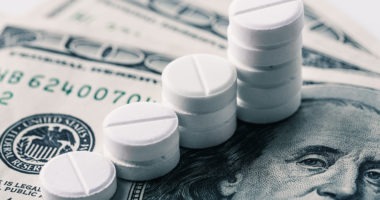COVID-19’s Impact on Global Pharma Supply Chains
In the wake of COVID-19, industry groups, including the Pharmaceutical Research and Manufacturers of America and the Association of Accessible Medicines, are raising concerns over reduced availability of international air transportation and increasing costs for shipping medicines into the US. What other supply-chain issues are of concern?
Industry groups weigh in on supply-chain concerns
A coalition of industry groups of the drug supply and payment chain directed a letter to US government officials on March 26, 2020 to raise concerns over certain issues of potential impact to pharmaceutical supply chains in light of the novel coronavirus (COVID-19). The letter was signed by representatives of the innovator pharmaceutical industry (Pharmaceutical Research and Manufacturers of America), the generic-drug industry (Association of Accessible Medicines), pharmacy benefit managers (Pharmaceutical Care Management Association), the specialty pharmacy industry (National Association of Specialty Pharmacy), pharmacists who practice in managed-care settings (Academy of Managed Care Pharmacists), health insurers (America’s Health Insurance Plans and the Blue Cross Blue Shield Association), and drug retailers (National Association of Chain Drug Stores). The letter was directed to US Vice President Mike Pence and Congressional leaders: Senator Mitch McConnell (R-KY), the Senate Majority Leader; Senator Chuck Schumer (D-NY), Senate Minority Leader; Congresswoman Nancy Pelosi (D-CA), Speaker of the US House of Representatives; and Congressman Kevin McCarthy (R-CA), House Minority Leader.
The industry groups addressed four main issues related to potential impact of drug supply chains relating to COVID-19: (1) international air transportation availability and rising costs; (2) possible executive action by the US government regarding US-based pharmaceutical manufacturing; (3) potential supply disruptions of drugs identified as potential treatments against COVID-19; and (4) limiting longer refills by patients of prescription drugs to mitigate the potential of drug shortages.
International air transportation availability and costs
With regard to air transportation and rising costs, the industry groups asked the Trump Administration to ensure availability of international air transportation at reasonable costs for the continued supply of medicines into the US. “We are also increasingly concerned that the reduction in the availability of international air transportation may be increasing costs for shipping critical medicines, upwards of 400% to 500% for shipment into the US healthcare system,” said the industry groups in their letter. “This growth in shipment costs creates particularly serious challenges for smaller companies and may result in medicine price increases at a time when many Americans are economically vulnerable due to the related economic crisis. We strongly encourage the Trump administration to work with the US airline industry to ensure that airlines that are flying reserve space for pharmaceuticals, medical devices, and medical supplies at reasonable rates.”
Repatriation of pharmaceutical manufacturing back to the US
The groups also raised concerns over potential executive action regarding requiring increased US-based pharmaceutical manufacturing. Last month (March 2020), Peter Navarro, Assistant to the President and Director of the Office of Trade and Manufacturing, said in media interviews (week of March 16, 2020) that he was working with President Donald Trump to finalize an executive order that would provide long-term incentives for US-based companies to produce medications and medical supplies domestically in the US. The strategy behind a proposed executive action consists of a multi-facet approach that would require federal agencies to purchase US-produced pharmaceuticals and medical equipment, deregulation, and incentivizing new technologies to encourage domestic production of pharmaceuticals and medical equipment in the US. There are also several Congressional proposals to encourage and/or require US-based manufacturing for pharmaceuticals and medical supplies.
”As you consider how best to respond to this unprecedented crisis, it is critical that the US Government not take steps that may have an unintended impact on the supply of pharmaceuticals in the United States,” said the industry groups in their March 26 letter. “All of our industries are concerned that a reported ‘Buy America’ Executive Order under consideration by the White House could have an immediate and detrimental impact on the ability of Americans who rely on federally funded health programs to access their medicines.”
This point was further underscored by the Association of Accessible Medicines, who along with 68 other healthcare and research groups, including the Pharmaceutical Research and Manufacturers of America, sent a separate letter on March 27, 2020 to President Donald Trump on possible executive action to require US-based manufacturing for drugs for federally funded programs. “As you take action through Executive Order or in coordination with Congress, it is critical that those policies do not restrict access to—or destabilize the supply chain for—currently available pharmaceuticals or medical devices. At this time, while supply chains for a broad range of US industries are stressed due to the global COVID-19 crisis and a number of factors related to the crisis have already raised concerns about shortages, it is important that we do not take any measures that could undermine the complex arrangements between firms that allow for efficient delivery of medicines to patients… Proposals to drive all manufacturing to the United States not only overestimate the potential feasibility and underestimate the time and effort it would take to make such changes, but also misunderstand that a diverse pharmaceutical supply chain is precisely what enables the industry to respond quickly and make adjustments in its supply-chain sourcing during natural emergencies and global public health crises.”
Potential supply disruptions of drugs identified as potential treatments against COVID-19
The eight industry groups (Pharmaceutical Research and Manufacturers of America, Association of Accessible Medicines, Pharmaceutical Care Management Association, National Association of Specialty Pharmacy, Academy of Managed Care Pharmacists, America’s Health Insurance Plans, the Blue Cross Blue Shield Association and the National Association of Chain Drug Stores) in their March 26 letter to Vice President Pence and Congressional leaders also raised concerns over potential drug shortages relating to drugs being investigated as possible treatments against COVID-19.
”As drugs are identified as potential treatments for COVID-19, the demand may outstrip the supply,” they said in their letter. “As a nation, it is imperative we balance the need to find drugs that may be helpful to treat COVID-19 while still making them reasonably available to patients who currently rely on them for established treatment. We recommend clinical guidance for healthcare providers be issued to ensure that patients who have been on therapies for FDA-approved indications prior to the spread of COVID-19 still have appropriate access, as well as those with COVID-19. It is important to prioritize access to drugs for patients in FDA clinical trials, which assist in evidence generation for COVID-19 treatments and vaccines for the entire population.”
To underscore those concerns, this week (March 31, 2020), the US Food and Drug Administration posted information regarding shortages of hydroxychloroquine and chloroquine, two potential treatments against COVID-19, to its drug shortages webpage due to a significant surge in demand. The agency says it is working with manufacturers to assess their supplies and is actively evaluating market demand for patients dependent on hydroxychloroquine and chloroquine for treatment of malaria, lupus and rheumatoid arthritis. The FDA says it is working with all manufacturers to ramp up production. Additionally, the US Department of Health and Human Services (HHS) has also accepted 30 million doses of hydroxychloroquine sulfate to the national stockpile and one million doses of chloroquine phosphate for possible use in treating patients hospitalized with COVID-19 or for use in clinical trials. Use of the donated medications is expected to help ease supply pressures for the drugs.
Prescription refills
The last item addressed by the industry groups is for government authorities to provide directions regarding prescription refills for patients in order to avoid potential shortages of drugs. “The US Food & Drug Administration (FDA) has been closely monitoring the drug supply chain for potential disruptions to supply or shortages caused by the COVID-19 pandemic,” said the industry groups in their March 26, 2020 letter. “Through their essential and leading role in monitoring the safety and resiliency of the drug supply chain, the FDA has been in regular communication with more than 180 manufacturers since late January alone to evaluate their entire supply chain, including active pharmaceutical ingredients, finished dose forms, and any components that may be impacted in any area of the supply chain due to the pandemic. But we know that even with this important ongoing work, Americans are concerned and that we must be prepared to avoid and address any shortages.”
To address possible shortages, the industry groups offered a recommendation for government authorities to provide guidance to patients. “We recommend that federal, state, and local government leaders urge patients to consider their personal circumstances, and if needed, consult their healthcare prescriber or pharmacist if they feel they need an early refill or other flexibilities,” said the industry groups in their March 26 letter. “Should there be shortages, or potential shortages, federal and state governments should recognize that patients may be able to have a smaller supply of drugs on hand so that more patients needing a given drug may be able to get it, and should also consider allowing pharmacies to dispense covered therapeutic alternatives if shortages occur.”




